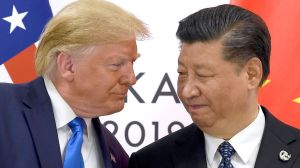Dear Atalji: Naik blows own trumpet on his reforms work
If you were still wondering why Petroleum Minister Ram Naik—who has stridently opposed the disinvestment of HPCL and BPCL to private an...

If you were still wondering why Petroleum Minister Ram Naik—who has stridently opposed the disinvestment of HPCL and BPCL to private and foreign firms—led a 55-member team to Rio de Janeiro for the World Petroleum Congress earlier this month, here’s an explanation, written by Naik himself. The minister has justified his Rio sojourn in a letter to the Prime Minister, underlining his efforts to attract foreign investment.
In his missive to A B Vajpayee, Naik—who flies off to Osaka tomorrow night to attend the International Energy Forum—said his Rio visit was undertaken to ‘‘highlight the momentous changes in the Indian economy that have taken place in the last four years under your (Vajpayee’s) leadership and showcase India’s technical capabilities and attractiveness as a preferable investment destination through as exhibition as well as bilateral meetings’’.
As reported by The Indian Express, Naik landed up in Rio with 40 delegates from government and state-run oil firms and 15 others to attend the World Petroleum Congress. In fact, Naik had wanted to take his Minister of State for Petroleum, Santosh Gangwar, along, but the PMO struck it down. The PMO had also curtailed Naik’s visit by two days to August 30-September 5 because of a Cabinet Committee on Disinvestment meeting on September 7.
Naik’s letter takes note of the criticism of the size of the delegation: he informs the PM that in fact, the Indian team was smaller than the team from the US (297), Nigeria (149), China (94), Argentina (90), France (82), Russia (71), the UK (70), Canada (69) and Venezuela (58). What Naik, however, neglected to specify is that most of these countries were represented by private firms or had large teams because of their geographical proximity to the venue.
Only two countries—China and Nigeria—were comparable to India, in that they were represented mainly by government officials and state-run oil companies. But, unlike India, the countries have large foreign investments in the hydrocarbon sector.
Naik declined comment on the letter. ‘‘I refuse to discuss the contents of the letter that I have written to the Prime Minister,’’ he told The Indian Express.
Naik’s letter also encloses a brief resume of his discussions during the summit. The highlight of the 10 meetings, he says, was an assurance from OPEC President and Secretary-General that global crude oil prices were unlikely to fall because of fears of a US-led attack on Iraq.
Again, something for the minister to consider: crude oil prices, instead of declining, have actually been on the increase since the US-Iraq standoff worsened.
However, as Naik correctly points out, his team was able to effectively project the far-reaching transformations in the Indian economy before the participants, ‘‘and the beneficial results of these efforts would certainly emerge in the years to come’’.
Naik also slipped into a little something for the PM: ‘‘I drew upon the address given by you at the Delhi Summit on Sustainable Development in February 2001, where recalling the Gandhian Principle of Antyodaya you had emphasized that ‘if we focus on the challenge faced by the most deprived communities, the world would surely become a better place’ ’’.
The letters also details the rough ride Naik and his 54-member delegation had during the Indo-Iraq Joint Commission meeting in July. The temperature was very hot—42 degrees centigrade— he complained, and the team had to drive for 14 hours to traverse the 1,100 km from Amman to Baghdad. In Osaka, fortunately for Naik, winter sets in early.






- 01
- 02
- 03
- 04
- 05

























